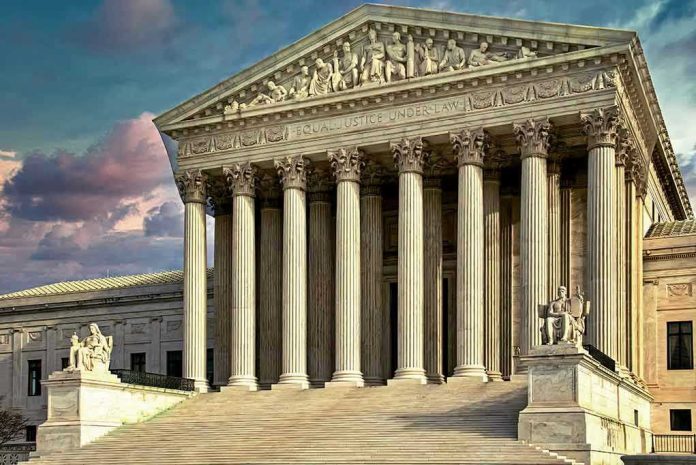
The confirmation of Emil Bove to the U.S. Court of Appeals for the Third Circuit might just be the most contentious judicial appointment of our time, sparking intense debates about the integrity and future of the American legal system.
At a Glance
- Emil Bove, former Trump attorney, confirmed to U.S. Appeals Court.
- The Senate vote was razor-thin, passing 50–49, with dissent from two Republican senators.
- Bove’s appointment has raised concerns about judicial independence and politicization.
- Bove’s close ties to Trump and controversial DOJ actions are at the heart of the debate.
Senate Confirms Bove Amidst Partisan Turmoil
On July 29, 2025, the United States Senate confirmed Emil Bove, a former defense attorney for President Donald Trump and a senior official in the Justice Department, to a lifetime position on the U.S. Court of Appeals for the Third Circuit. This decision passed by a narrow vote of 50–49, highlighting the stark partisan divide surrounding his appointment. Republican Senators Susan Collins and Lisa Murkowski were the only members of their party to oppose the nomination, citing concerns over Bove’s impartiality and his previous role in purging prosecutors involved in January 6 investigations.
This confirmation has not only ignited a fierce debate over judicial independence but has also underscored the ongoing tension in the American political landscape. With Bove’s close ties to Trump and his controversial actions during his time at the Justice Department, many are questioning the long-term implications of such a politically charged appointment.
Bove’s Controversial Background and DOJ Tenure
Emil Bove’s journey to the appellate court bench has been anything but typical. His career is marked by his tenure as acting head of the Justice Department during the early months of Trump’s second term, where he made headlines for his aggressive purging of officials involved in the January 6 prosecutions. This move was seen by many as an attempt to shield Trump allies from scrutiny and has been a significant point of contention throughout Bove’s nomination process. His actions have drawn criticism from both sides of the aisle, with concerns about the erosion of traditional norms of judicial independence and the integrity of the DOJ.
Bove’s nomination was part of a broader strategy by Trump to align the federal judiciary with his political agenda. This approach has been met with resistance from Senate Democrats and even some Republicans, who fear the long-term consequences of such partisan appointments on the American legal system.
Implications for the Federal Judiciary
Bove’s confirmation to the Third Circuit Court of Appeals is a testament to the increasing politicization of the judiciary. This development raises significant questions about the future of judicial independence in the United States. The Third Circuit, which oversees Delaware, New Jersey, Pennsylvania, and the Virgin Islands, will now have a judge with deep ties to the Trump administration, potentially influencing decisions in politically sensitive cases.
The razor-thin vote margin reflects a growing trend of hyper-partisan judicial appointments, which could undermine public confidence in the judiciary. With Bove’s track record, there is a legitimate concern that his decisions might prioritize political loyalty over impartial justice, setting a dangerous precedent for future judicial nominations.
Reactions from Key Stakeholders
The confirmation has drawn sharp reactions from various stakeholders. Senate Democrats have unanimously opposed Bove’s nomination, emphasizing the threat to judicial impartiality. Senator Cory Booker of New Jersey, in particular, has been vocal about his concerns regarding Bove’s qualifications and the potential impact on the legal system. On the other hand, supporters argue that Bove is a seasoned attorney with extensive legal experience, defending Trump’s right to nominate candidates aligned with his vision for the judiciary.
Former federal judges and legal scholars have also weighed in, warning about the dangers of appointing judges with overt political affiliations. They argue that such appointments could embolden future administrations to prioritize political loyalty over qualifications, further eroding the independence of the judiciary.



